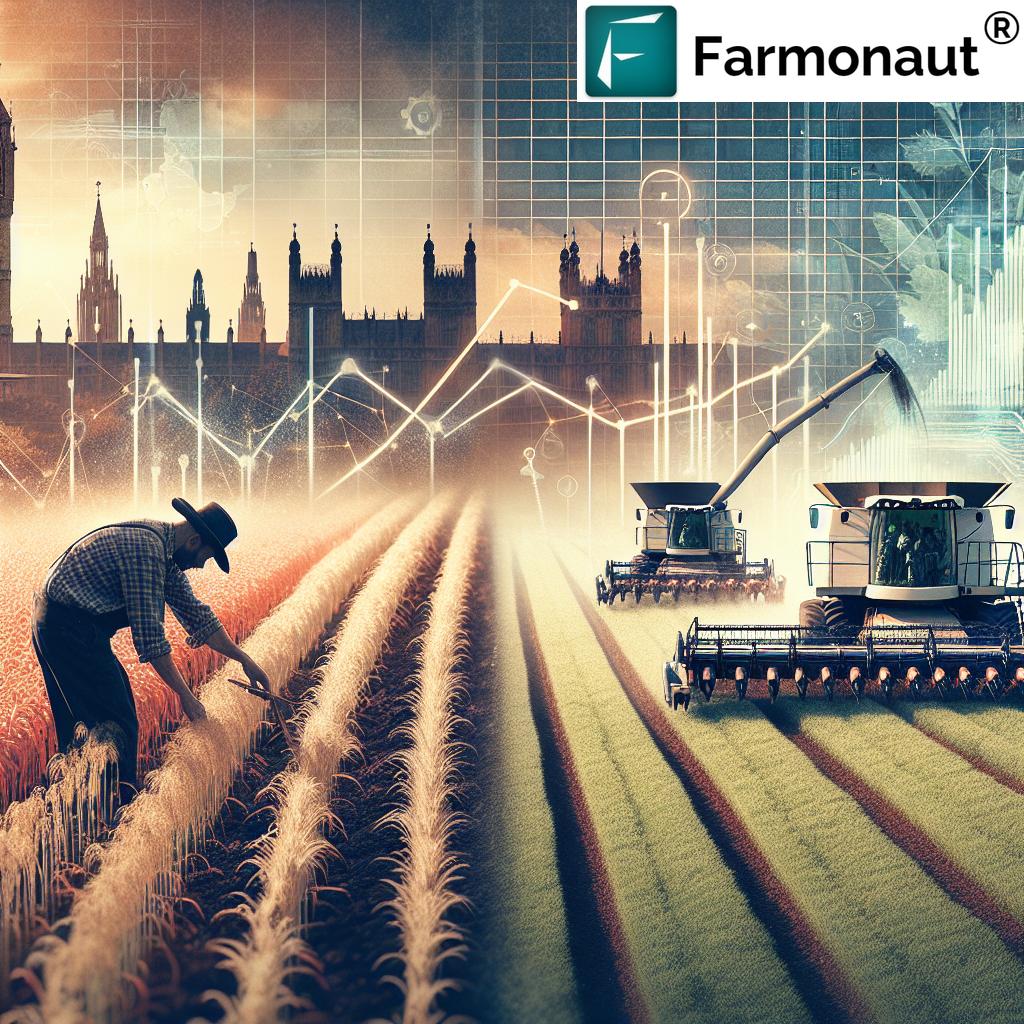UK Food Supply Chains at Breaking Point: Addressing Agricultural Challenges for Sustainable Farming
“UK farmers face a triple threat: 65% report labor shortages, 78% struggle with import difficulties, and 92% experience rising production costs.”
In recent years, the UK agricultural sector has found itself at a critical juncture, facing unprecedented challenges that threaten the stability of our food supply chains. As we delve into this complex landscape, we’ll explore the multifaceted issues affecting farming across England, Scotland, and Wales, and discuss potential solutions to ensure a sustainable future for British agriculture.

The Perfect Storm: Labor Shortages, Import Difficulties, and Rising Costs
The UK farming industry is currently grappling with a trio of challenges that have brought our food supply chains to a breaking point:
- Labor Shortages: Post-Brexit immigration policies have significantly reduced the availability of seasonal workers, leaving many farms understaffed during critical harvesting periods.
- Import Difficulties: New trade regulations have complicated the import process for essential farming inputs, leading to delays and increased costs.
- Rising Production Costs: Inflation, energy price hikes, and the need for sustainable practices have driven up the overall cost of farm operations.
These challenges are not isolated; they interconnect and compound each other, creating a ripple effect across the entire agricultural sector. From arable farming to livestock management and grassland cultivation, every aspect of UK agriculture is feeling the strain.
Impact on Arable Farming
Arable farming, which includes the cultivation of crops such as wheat, barley, and oilseed rape, has been hit particularly hard by the current crisis. Labor shortages have led to unharvested crops rotting in fields, while import difficulties have made it challenging to source necessary seeds, fertilizers, and plant protection products.
Rising costs have forced many arable farmers to reassess their crop rotations and consider alternatives that require less input. This shift could potentially impact the UK’s food security and export capabilities in the long term.
Livestock Management Under Pressure
The livestock sector, including dairy, beef, sheep, and poultry, faces its own set of challenges. Labor shortages have affected processing facilities, leading to backlogs and potential animal welfare issues. Import difficulties have disrupted the supply of animal feed and veterinary medicines, while rising energy costs have increased the expenses associated with housing and caring for livestock.
Dairy farmers, in particular, are feeling the squeeze as milk prices struggle to keep pace with rising production costs. This imbalance threatens the viability of many dairy operations across the UK.
Grassland and Pasture Management Challenges
Grassland farming, crucial for livestock grazing and silage production, is not immune to the current crisis. The reduced availability of seasonal workers has made it difficult to maintain pastures and carry out essential tasks such as hedge cutting and fence repair. Additionally, the rising costs of fertilizers and machinery maintenance have put pressure on grassland farmers to find more cost-effective solutions.
“The UK agricultural sector employs over 470,000 people and contributes approximately £10.4 billion annually to the national economy.”
The Urgent Need for Sustainable Farming Practices
As we face these immediate challenges, it’s clear that the long-term sustainability of UK agriculture depends on our ability to adopt and implement sustainable farming practices. These practices not only help mitigate environmental impact but can also improve resilience and efficiency in the face of current and future challenges.
- Precision Agriculture: Utilizing technology to optimize resource use and increase yields.
- Regenerative Farming: Focusing on soil health and biodiversity to enhance natural ecosystem services.
- Agroforestry: Integrating trees and shrubs into crop and animal farming systems for multiple benefits.
- Water Management: Implementing efficient irrigation systems and water conservation techniques.
To address these challenges and promote sustainable farming, innovative solutions are needed. This is where technology like Farmonaut’s satellite-based farm management platform can play a crucial role. By providing real-time crop health monitoring and AI-driven advisory systems, such tools can help farmers make informed decisions and optimize their operations.
Agricultural Innovation: A Path Forward
Innovation in agriculture is not just about adopting new technologies; it’s about reimagining how we approach farming as a whole. From vertical farming in urban areas to the development of drought-resistant crop varieties, the UK agricultural sector is ripe for transformation.
Some key areas of innovation include:
- AI and Machine Learning: For predictive analytics in crop and livestock management.
- Robotics and Automation: To address labor shortages and increase efficiency.
- Biotechnology: For developing resilient crop varieties and improving livestock genetics.
- Alternative Protein Sources: To diversify food production and reduce environmental impact.
Government Interventions and Policy Strategies
Addressing the challenges facing UK agriculture requires a coordinated effort between farmers, industry stakeholders, and government bodies. Potential policy interventions could include:
- Revised Immigration Policies: To ensure an adequate workforce for seasonal agricultural labor.
- Investment in Rural Infrastructure: To support the modernization of farming practices and improve connectivity.
- Targeted Subsidies: To encourage the adoption of sustainable farming methods and technologies.
- Trade Agreements: To facilitate smoother import and export processes for agricultural goods.
- Education and Training Programs: To develop a skilled agricultural workforce for the future.
These policy strategies should aim to create a more resilient and sustainable agricultural sector that can withstand future shocks and continue to provide food security for the UK population.
Strengthening Local Food Production
One key strategy for addressing the current crisis is to strengthen local food production. By reducing reliance on imports and shortening supply chains, we can create a more resilient food system. This approach offers several benefits:
- Reduced transportation costs and carbon footprint
- Fresher produce with higher nutritional value
- Improved food security through diversified local sources
- Support for local economies and rural communities
Initiatives to support local food production could include:
- Community-supported agriculture (CSA) programs
- Urban farming projects
- Farm-to-school initiatives
- Local food hubs and distribution networks
The Role of Technology in Addressing Farming Challenges
As we look for solutions to the current agricultural crisis, technology plays an increasingly important role. Advanced farm equipment and digital tools can help address many of the challenges facing UK farmers:
- Tractors and Machinery: Modern tractors equipped with GPS and automated steering systems can improve efficiency and reduce labor requirements.
- Sprayers and Spreaders: Precision application technology helps optimize the use of fertilizers and pesticides, reducing costs and environmental impact.
- Drones and Satellite Imaging: These tools provide valuable data for crop monitoring and decision-making.
- Smart Irrigation Systems: Automated systems can optimize water use based on real-time soil moisture and weather data.
- Livestock Management Software: Digital tools for tracking animal health, feeding, and breeding can improve productivity and welfare.
By leveraging these technologies, farmers can increase productivity, reduce costs, and improve sustainability. However, it’s important to ensure that these tools are accessible and affordable for farms of all sizes.
Explore Farmonaut’s API for advanced agricultural data
Diversification: A Strategy for Resilience
Farm diversification has become an increasingly important strategy for UK farmers looking to spread risk and increase income streams. Some popular diversification options include:
- Agritourism (farm stays, pick-your-own operations)
- On-farm processing and value-added products
- Renewable energy production (solar, wind, biomass)
- Contract services (machinery hire, land management)
- Alternative crops or livestock (e.g., specialty breeds, niche products)
Diversification not only provides additional income but can also help farms become more resilient to market fluctuations and environmental challenges.

Addressing Parasites and Disease Management
Effective parasite and disease management is crucial for maintaining healthy livestock and crops. With import difficulties affecting the availability of some veterinary medicines and plant protection products, UK farmers need to explore alternative strategies:
- Integrated Pest Management (IPM): Combining biological, cultural, and chemical control methods to manage pests and diseases effectively.
- Rotational Grazing: To reduce parasite burdens in livestock and improve pasture health.
- Resistant Varieties: Developing and using crop varieties with natural resistance to common diseases.
- Biosecurity Measures: Implementing strict protocols to prevent the introduction and spread of diseases on farms.
By adopting these strategies, farmers can reduce their reliance on chemical interventions and create more resilient farming systems.
Access Farmonaut’s API Developer Docs for integration insights
The Future of UK Farming: Adapting to Change
As we look to the future, it’s clear that UK farming must continue to evolve and adapt to meet the challenges ahead. This evolution will likely involve:
- Increased adoption of precision agriculture and data-driven decision-making
- Greater emphasis on sustainability and environmental stewardship
- Diversification of income streams and business models
- Collaboration between farmers, researchers, and technology providers
- Ongoing investment in agricultural education and skills development
By embracing these changes and leveraging innovative solutions, the UK agricultural sector can overcome its current challenges and build a more resilient and sustainable food system for future generations.
UK Agricultural Challenges and Potential Solutions
| Challenge | Impact | Potential Solutions |
|---|---|---|
| Labor Shortages | Unharvested crops, reduced productivity | Revised immigration policies, investment in automation |
| Import Difficulties | Delayed access to inputs, increased costs | Streamlined trade agreements, local supply chain development |
| Rising Production Costs | Reduced profitability, threat to farm viability | Efficiency improvements, diversification, targeted subsidies |
| Sustainability Concerns | Environmental degradation, regulatory pressure | Adoption of sustainable farming practices, precision agriculture |
| Climate Change | Unpredictable weather, crop failures | Resilient crop varieties, improved water management |
Conclusion: A Call to Action
The challenges facing UK food supply chains and the agricultural sector are undoubtedly complex and multifaceted. However, they also present an opportunity for transformation and innovation. By embracing sustainable farming practices, leveraging technology, and implementing supportive policies, we can create a more resilient and productive agricultural system.
As we move forward, it’s crucial that all stakeholders – farmers, policymakers, technology providers, and consumers – work together to support the transition to a more sustainable and secure food future. The health of our agricultural sector is not just an economic issue; it’s fundamental to our food security, rural communities, and national well-being.
We encourage all those involved in UK agriculture to stay informed, engage with new technologies and practices, and participate in the ongoing dialogue about the future of farming. Together, we can overcome the current challenges and build a thriving agricultural sector that serves the needs of both people and the planet.
Farmonaut Subscriptions
FAQ Section
Q: What are the main challenges facing UK food supply chains?
A: The main challenges include labor shortages, import difficulties, and rising production costs, which are putting significant strain on the agricultural sector.
Q: How can sustainable farming practices help address these challenges?
A: Sustainable farming practices can improve resilience, reduce input costs, and mitigate environmental impacts, helping farmers adapt to current challenges while ensuring long-term viability.
Q: What role does technology play in addressing agricultural challenges?
A: Technology, such as precision agriculture tools, AI-driven advisory systems, and advanced farm equipment, can help optimize resource use, increase productivity, and support decision-making in farming operations.
Q: How can the government support the UK agricultural sector?
A: Government support can include revised immigration policies, investment in rural infrastructure, targeted subsidies for sustainable practices, and facilitating trade agreements to ease import and export processes.
Q: What are some ways farmers can diversify their operations?
A: Farmers can diversify through agritourism, on-farm processing, renewable energy production, offering contract services, or exploring alternative crops and livestock options.






